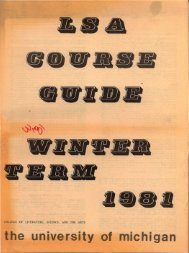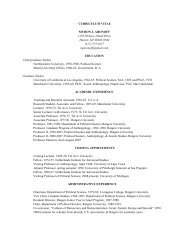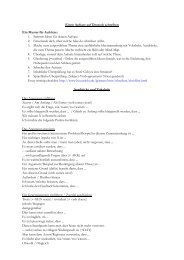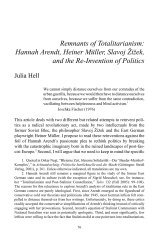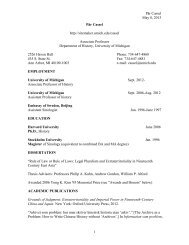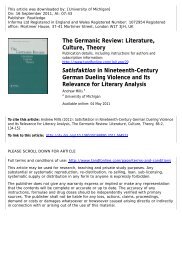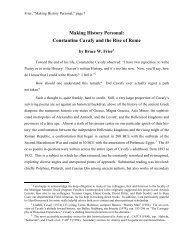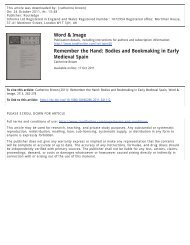"Cavafy Through the Looking-Glass" by Manuel Savidis
"Cavafy Through the Looking-Glass" by Manuel Savidis
"Cavafy Through the Looking-Glass" by Manuel Savidis
Create successful ePaper yourself
Turn your PDF publications into a flip-book with our unique Google optimized e-Paper software.
"<strong>Cavafy</strong> <strong>Through</strong> <strong>the</strong> <strong>Looking</strong>-Glass" <strong>by</strong> <strong>Manuel</strong> <strong>Savidis</strong><br />
<strong>Manuel</strong> <strong>Savidis</strong> is <strong>the</strong> curator of <strong>the</strong> <strong>Cavafy</strong> Archive in A<strong>the</strong>ns, Greece<br />
C. P. <strong>Cavafy</strong> (1863-1933) is one of <strong>the</strong> major poets of modern Greece. The appeal of his poetry has only<br />
streng<strong>the</strong>ned over time, both in Greece and abroad: he is certainly <strong>the</strong> modern Greek poet translated<br />
more often and in <strong>the</strong> most languages. He was a complex person but a deceptively simple poet, and <strong>the</strong><br />
apparent simplicity of his poetry (which was crafted painstakingly over <strong>the</strong> course of decades), is <strong>the</strong><br />
reason why <strong>Cavafy</strong> is so easy to translate, and so hard to translate well.<br />
Like all major works of art, <strong>Cavafy</strong>'s poetry serves as a looking-glass. Over <strong>the</strong> years, we have had<br />
portraits of <strong>Cavafy</strong> as a sensual, political, historical or ironical poet, and so forth, depending on <strong>the</strong><br />
scholar's point of view and <strong>the</strong> various academic approaches which were prevalent at any given time.<br />
Some of <strong>the</strong>se portraits were quite insightful, at least in part -- <strong>the</strong> part of <strong>the</strong> poetry. The part of <strong>the</strong> poet's<br />
life, whatever its value for <strong>the</strong> poetry, has remained unexamined to large extent, ei<strong>the</strong>r because <strong>the</strong><br />
scholars omitted to sift through <strong>the</strong> ample documentation of <strong>Cavafy</strong>'s life, or because <strong>the</strong>y chose to ignore<br />
facts which contradicted <strong>the</strong>ir <strong>the</strong>ories.<br />
<strong>Cavafy</strong> as a public persona and a poet was one thing; <strong>Cavafy</strong>, <strong>the</strong> man, was quite ano<strong>the</strong>r. Anyone<br />
claiming insight into <strong>the</strong> man based solely on a reading of his poems is bound to be trumped <strong>by</strong> <strong>the</strong><br />
factual evidence. The mental image most of us have of <strong>Cavafy</strong> is that of an elderly homosexual,<br />
composing verse in a candle-lit room. It is a romantic and possibly comforting image, and probably<br />
accurate for <strong>the</strong> last years of his life. But before he was old, <strong>Cavafy</strong> was young; before homosexual, he<br />
was bisexual; and he had electric light installed in his home for a number of years.<br />
The more recent academic slants on <strong>Cavafy</strong> focus on his qualities as a syncretic, diasporic or gay poet.<br />
Of course <strong>the</strong>y are worthwhile viewpoints, too, as will be <strong>the</strong> viewpoints which will emerge in years to<br />
come. Since <strong>the</strong>ir emphasis is on ideology, <strong>the</strong> interpretation of history and sexual orientation, <strong>the</strong>y have<br />
to be informed <strong>by</strong> <strong>the</strong> biographical and historical data in order to be comprehensive and persuasive.<br />
<strong>Cavafy</strong> would scoff at most modern characterizations of himself. He knew full well how slippery <strong>the</strong>se<br />
terms are, and how <strong>the</strong>ir apparent meaning evolves in time. Can we seriously apply <strong>the</strong> term 'diasporic'<br />
with all its modern connotations to a poet who flourished almost a century ago, who felt that <strong>the</strong> diaspora
was <strong>the</strong> norm while <strong>the</strong> concentration of uppity Greeks in <strong>the</strong> tiny Modern Greek State was an<br />
abberation? As for <strong>the</strong> term 'gay', anyone who has read <strong>Cavafy</strong>?s poetry will agree that it does not do<br />
justice to <strong>the</strong> sensibility and sexuality expressed <strong>the</strong>rein.<br />
<strong>Cavafy</strong>'s sexuality evolved over <strong>the</strong> years, along with his personality and his poetry. Although his erotic<br />
poems are almost exclusively homosexual, <strong>Cavafy</strong> spent most of his adult life trying to avoid <strong>the</strong> tag of a<br />
'gay poet'. He tried to be remembered solely as a poet, with no modifiers, with <strong>the</strong> possible exception of<br />
'Greek' -- a word which defies simple translation. The various terms used over <strong>the</strong> centuries to describe a<br />
common people along a shifting historical continuum -- 'Hellene' and its derivatives (Hellenic, Hellenistic),<br />
'Roman' (Romios), 'Greek' (Graecus) -- carry <strong>the</strong>ir own semantic and emotional baggage and were used<br />
very carefully <strong>by</strong> <strong>Cavafy</strong> in his poems and prose, in a masterful display of historical precision and<br />
scholarship.<br />
The study of <strong>Cavafy</strong> as a Greek (or Modern Greek) poet has been sorely neglected, and understandably<br />
so; such an approach would provoke nationalistic tremors in Greece, while most scholars abroad cannot<br />
distinguish between 'Greekness' and 'Hellenism', as used <strong>by</strong> <strong>the</strong> poet. Then <strong>the</strong>re is always <strong>the</strong> question<br />
of common terminology that unconsciously divides and confuses academia: when a modern Greek uses<br />
<strong>the</strong> term 'Greek' he naturally refers to 'Modern Greek'. When a non-Greek uses <strong>the</strong> term 'Greek' he refers<br />
to 'Ancient (or Classical) Greek.'<br />
<strong>Cavafy</strong> himself gave us <strong>the</strong> initial diagnostic tools for examining his work, dividing his poems into discrete<br />
categories. That does not mean that we have to stop <strong>the</strong>re and content ourselves with his<br />
categorisations, only that we should consider <strong>the</strong>m carefully. After doing so, we can proceed to <strong>the</strong> more<br />
peripheral aspects of his poetry. And if we start to try to explain him using personal ra<strong>the</strong>r than literary<br />
criteria, <strong>the</strong>re are plenty more to choose from than his sexual orientation: one was his life-long passionate<br />
smoking habit, which ultimately killed him. <strong>Cavafy</strong> was a practicing smoker longer than he was a<br />
practicing homosexual. How did that influence his poetry?<br />
O<strong>the</strong>r aspects of <strong>Cavafy</strong>'s life remain largely unexamined but, none<strong>the</strong>less, <strong>the</strong>y shaped his personality,<br />
and <strong>the</strong>refore his poetry. He was an avid tennis player, at least until <strong>the</strong> age of 45 (are we ready to read<br />
'Waiting for <strong>the</strong> barbarians' as <strong>the</strong> work of a tennis player? Can we amend our mental image of <strong>Cavafy</strong> to<br />
include him in white shorts, toiling after a ball at <strong>the</strong> San Stefano Club grounds under <strong>the</strong> Egyptian sun?)<br />
<strong>Cavafy</strong> was also a public servant; a drinker; an inveterate gambler and, <strong>by</strong> all accounts, a terrific dancer.<br />
He was also shortsighted, and short of stature; he was a seventh son. Take your pick and draft your<br />
<strong>the</strong>sis. Or, better still, read his poems again.<br />
The late Andreas Kitsos-Mylonas put it best in an article written in 1983, on <strong>the</strong> fiftieth anniversary of <strong>the</strong><br />
poet?s death: 'Any text on C.P. <strong>Cavafy</strong> answers only to its own prejudice regarding <strong>the</strong> work and <strong>the</strong><br />
remorse generated <strong>by</strong> <strong>the</strong> fact'. Present text included.<br />
Copyright 2005, <strong>Manuel</strong> <strong>Savidis</strong>





